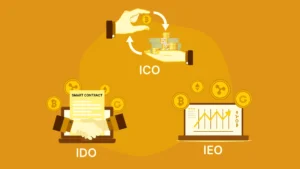
DYDX exploration reveals why it’s become a leading platform for advanced crypto trading. As demand for similar features grows, creating a DYDX clone gains popularity. These clones provide the same powerful trading experience, customizable to meet diverse needs. In this blog, we’ll dive into what makes DYDX unique and how building its clone could shape the future of crypto trading.
Decentralized Exchanges (DEXs) – Empowering Crypto Trading
Cryptocurrency trading has seen a surge in popularity, but navigating the exchanges can be daunting, especially for beginners. In the world of crypto trading, you’ll often come across terms like Centralized Exchange (CEX) and Decentralized Exchanges (DEXs). But what exactly do these terms mean, and why is decentralized exchange gaining traction? As more traders seek transparency, security, and control over their assets, Decentralized Exchange Development Company have become increasingly important. These services empower businesses and developers to build robust, user-friendly decentralized trading platforms that eliminate intermediaries and enhance user privacy.
Centralized Exchanges – The Traditional Banking Model of Crypto
Centralized exchanges (CEXs) operate similarly to traditional banks in the crypto world. When you sign up on a centralized exchange, you’re essentially handing over control of your funds to the exchange’s administrators.
This means that your access and authority over your funds are determined by the exchange’s policies, and you’re often required to undergo Know Your Customer (KYC) procedures, which involve sharing personal information.
Drawbacks of Centralized Exchanges
However, centralized exchanges come with their fair share of drawbacks. Server issues and maintenance problems are common, leading to disruptions in trading activities. Moreover, centralized exchanges are susceptible to security breaches, putting users’ funds at risk.
Decentralized Exchanges (DEXs) – Empowering Users
One of the pioneering DEXs is DYDX, which allows users to engage in futures trading. DYDX stands as a prime example of advanced Decentralized Exchanges Development , offering a user experience similar to that of a centralized exchange. Instead of relying on a username and password, you connect your wallet, such as Metamask, which serves as your gateway to the platform.
Smart Contracts – Ensuring Transparency and Security
One of the key features of DEXs like DYDX is the use of smart contracts. When you initiate a trade, your funds are deposited into a smart contract, ensuring transparency and security. Additionally, gas fees on DEXs are typically lower than those on centralized exchanges, making trading more cost-effective.
Trading on DEXs – A Similar Yet Decentralized Experience
When it comes to trading on a DEX, the process is similar to that of a centralized exchange. You can view market data, place orders, and track your portfolio. The main difference lies in the interface and execution, with DEXs offering a more decentralized approach.
Conclusion – The Rise of Decentralized Exchanges
In conclusion, decentralized exchanges offer a viable alternative to centralized exchanges, providing users with greater control, enhanced security and lower transaction fees. As the crypto landscape continues to evolve, Decentralized Exchanges are poised to play a crucial role in shaping the future of cryptocurrency trading.
Author Profile
Nadcab Labs A Leading Blockchain Developers With over 8+ years of experience in, Custom Blockchain Development, Smart Contract Development, Crypto Exchange Development, Token Creation and Many More Services.







